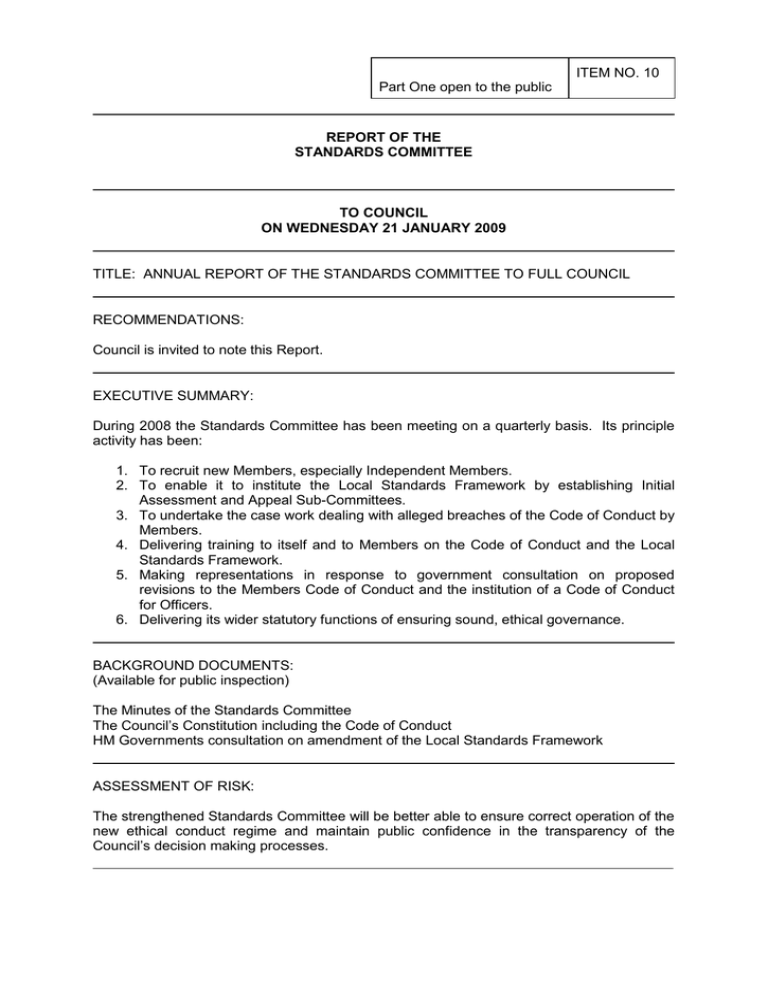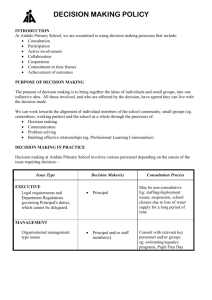ITEM NO. 10 Part One open to the public
advertisement

ITEM NO. 10 Part One open to the public REPORT OF THE STANDARDS COMMITTEE TO COUNCIL ON WEDNESDAY 21 JANUARY 2009 TITLE: ANNUAL REPORT OF THE STANDARDS COMMITTEE TO FULL COUNCIL RECOMMENDATIONS: Council is invited to note this Report. EXECUTIVE SUMMARY: During 2008 the Standards Committee has been meeting on a quarterly basis. Its principle activity has been: 1. To recruit new Members, especially Independent Members. 2. To enable it to institute the Local Standards Framework by establishing Initial Assessment and Appeal Sub-Committees. 3. To undertake the case work dealing with alleged breaches of the Code of Conduct by Members. 4. Delivering training to itself and to Members on the Code of Conduct and the Local Standards Framework. 5. Making representations in response to government consultation on proposed revisions to the Members Code of Conduct and the institution of a Code of Conduct for Officers. 6. Delivering its wider statutory functions of ensuring sound, ethical governance. BACKGROUND DOCUMENTS: (Available for public inspection) The Minutes of the Standards Committee The Council’s Constitution including the Code of Conduct HM Governments consultation on amendment of the Local Standards Framework ASSESSMENT OF RISK: The strengthened Standards Committee will be better able to ensure correct operation of the new ethical conduct regime and maintain public confidence in the transparency of the Council’s decision making processes. SOURCE OF FUNDING: Existing budgets COMMENTS OF THE STRATEGIC DIRECTOR OF CUSTOMER AND SUPPORT SERVICES (or his representative): 1. LEGAL IMPLICATIONS Provided by: Anthony Rich The requirements for a Standards Committee, the Local Standards Framework and for the involvement of the Independent Members is embedded in statute law. 2. FINANCIAL IMPLICATIONS Provided by : Not applicable 3. ICT STEERING GROUP IMPLICATIONS Provided by: Not applicable PROPERTY (if applicable): Not applicable HUMAN RESOURCES (if applicable): Not applicable CONTACT OFFICER: Anthony Rich, City Solicitor and Monitoring Officer. Tel: 0161 793 3000 KEY DECISION: No WARD(S) TO WHICH REPORT RELATE(S): All KEY COUNCIL POLICIES: Code of Conduct for Members DETAILS: Establishment The increased workload the Committee anticipated from the Local Standards Framework has indeed materialised. The establishment of the Committee was extended to meet this workload and a recruitment and selection exercise was conducted, which is reported on separately to Council. The Committee conducted an exercise to recruit three additional independent members. There are now (or will be after January Council) five independent members and eight elected members serving on the Committee. Your Standards Committee believe this is sufficient. 2 Institution of the Local Standards Framework The details of the new framework were announced very shortly before the May 2008 elections and into force soon afterwards. The Standards Committee has appointed Initial Assessment and Appeal Sub-Committees. In essence all Members serve on both Sub-Committees and a Panel is drawn to deal with any specific case. The method of operation makes best use of the available Member and Independent Member resource as well as leading to rapid handling of case work. It complies with Standards Board Guidance which has also been received and considered during the year. Case Work The Monitoring Officer reports that he has received notification of six cases where it was alleged, or might have been alleged, that a Member had broken the Code of Conduct. In two of those cases the Monitoring Officer wrote to the complainants to clarify whether or not they were alleging a breach of the Code of Conduct. In one case the complainant did not reply. In the other the complainant did make a complaint which, as at 31 December 2008 was awaiting consideration by the Initial Assessment Sub-Committee. The other four cases were considered by the Initial Assessment Sub-Committee. Of those four cases one was dismissed, two were referred back to the Monitoring Officer for investigation and one was referred to the Standards Board for England. The complainant did not appeal the case that was dismissed by the Initial Assessment SubCommittee. Of the two cases referred to the Monitoring Officer one has been investigated and resulted in a finding of no breach, with the Member concerned exercising their right to request the Committee not to publish the result. The other investigation is still in progress. With such a small number of cases statistical data is of limited value but Standards Committee’s impression is that, after an initial delay whilst the new system was established, cases are progressing to Initial Assessment quicker and any resulting investigations are being conducted and completed sooner, than under the previous regime where matters were dealt with initially by the Standards Board for England. Government Consultation on changes to the Code A lengthy consultation paper was put out by HM Government and the Standards Committee has responded to it. It is understood that changes are proposed to the new Code which will come into effect at the beginning of municipal year 2009/10. Whilst the matter is still at the consultation stage Standards Committee cannot be sure what those changes might be but do note that some of the key issues being addressed concern: The Members Code should apply to conduct outside official activity The linkage between ethical investigations and criminal process The incorporation of the “Nolan” general principles of conduct as a pre-amble for the Members Code Inclusion in the Members Code of a general duty to abide by the law 3 A proposed model Code of Conduct for local government employees Training The Standards Committee has provided training in the Members Code of Conduct and in governance issues for Members throughout the year but is sorry to note that only approximately 60% of Members have taken advantage of the training offered. The Standards Committee will be arranging further sessions and will also be arranging a further set of sessions to brief Members of the reform of the Code once it changes. The Standards Committee would emphasise to Members the desirability of all Members attending this training. 4




